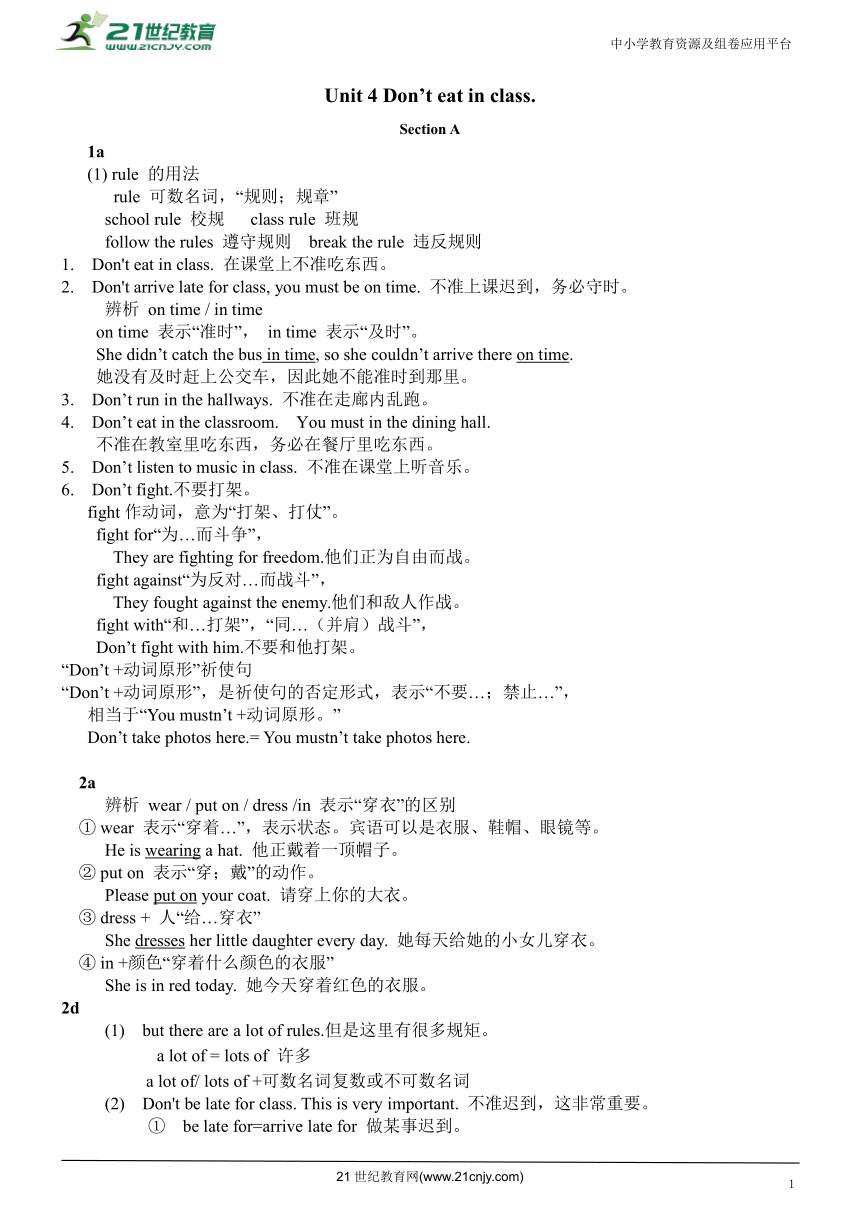
中小学教育资源及组卷应用平台 Unit 4 Don’t eat in class. Section A 1a (1) rule 的用法 rule 可数名词,“规则;规章” school rule 校规 class rule 班规 follow the rules 遵守规则 break the rule 违反规则 1. Don't eat in class. 在课堂上不准吃东西。 2. Don't arrive late for class, you must be on time. 不准上课迟到,务必守时。 辨析 on time / in time on time 表示“准时”, in time 表示“及时”。 She didn’t catch the bus in time, so she couldn’t arrive there on time. 她没有及时赶上公交车,因此她不能准时到那里。 3. Don’t run in the hallways. 不准在走廊内乱跑。 4. Don’t eat in the classroom. You must in the dining hall. 不准在教室里吃东西,务必在餐厅里吃东西。 5. Don’t listen to music in class. 不准在课堂上听音乐。 6. Don’t fight.不要打架。 fight作动词,意为“打架、打仗”。 fight for“为…而斗争”, They are fighting for freedom.他们正为自由而战。 fight against“为反对…而战斗”, They fought against the enemy.他们和敌人作战。 fight with“和…打架”,“同…(并肩)战斗”, Don’t fight with him.不要和他打架。 “Don’t +动词原形”祈使句 “Don’t +动词原形”,是祈使句的否定形式,表示“不要…;禁止…”, 相当于“You mustn’t +动词原形。” Don’t take photos here.= You mustn’t take photos here. 2a 辨析 wear / put on / dress /in 表示“穿衣”的区别 ① wear 表示“穿着…”,表示状态。宾语可以是衣服、鞋帽、眼镜等。 He is wearing a hat. 他正戴着一顶帽子。 ② put on 表示“穿;戴”的动作。 Please put on your coat. 请穿上你的大衣。 ③ dress + 人“给…穿衣” She dresses her little daughter every day. 她每天给她的小女儿穿衣。 ④ in +颜色“穿着什么颜色的衣服” She is in red today. 她今天穿着红色的衣服。 2d (1) but there are a lot of rules.但是这里有很多规矩。 a lot of = lots of 许多 a lot of/ lots of +可数名词复数或不可数名词 (2) Don't be late for class. This is very important. 不准迟到,这非常重要。 ① be late for=arrive late for 做某事迟到。 Don't arrive late for class.= Don't be late for class. ② important 形容词“重要的” importance 名词“重要性” It’s important for sb . to do sth. “对某人来说做某事是很重要的” It’s important for us to learn English well. (3) Can we bring music players to school 我们可以带音乐播放器起学校吗 bring 指“带来;取来” bring sb. sth. =bring sth. for sb. 给某人带来某物 Please bring the book for me. = Please bring me the book. 请把那本书带给我。 辨析:bring 和take ① bring 指从别处带到说话者所在的地方。 ② take 意为“拿走;带走”,指从说话者所在的地方带到远处去。 bring sth. to sp./sb. 把某物带来给某人/带来到某地 take sth. to sb./sp. 把某物带去给某人/带去到某地 Please take the book to him. 请把这本书带给他。 Please bring the book for me. 请把那本书带给我 (4) Oh, and we also have to be quite in the library. 哦,在图书馆也必须要保持安静 be+ 形容词 表示某种状态 介词短语 Grammar Focus. 祈使句 定义:祈使句一般用来表示请求、命令、劝说、号召、警告等。祈使句通常省略主语you, 其肯定形式以动词原形开头,其否定形式在动词原形前加don’t, 句尾用句号或感叹号。为表示礼貌,可以在句首或句尾加上please,加在句末时用逗号与前句隔开。 形式: Do型 肯定句:动词 ... ...
~~ 您好,已阅读到文档的结尾了 ~~

